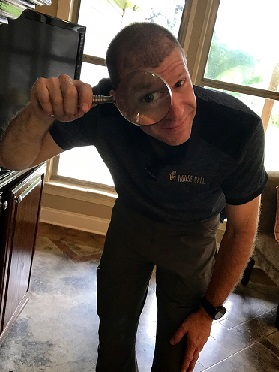Real estate agents. Certified Public Accountants. Attorneys. Personal Trainers. What do all these professions have in common, you might ask? Each one of them is in a service-based business, just like a professional home inspector. None of these people are selling you a physical product; they’re selling you their services.

Most of us have probably not even stopped to think about this question, but do you think of yourself as being in the service business?
Agents provide guidance when you’re buying or selling real estate. Your CPA uses their training to make sure that your accounting is done properly, and you don’t get in trouble with the IRS. Attorneys help with legal entanglements, assisting us whenever someone accuses us (or is accused by us) of breaking the law. A trainer guides us when we’re exercising so that we get the most benefit from our routine with the least possibility of injury.
Inspection as a Service
As professional home inspectors, we’re also there to provide a service to our clients. We utilize our accumulated knowledge and expertise to analyze structures for our customers. It’s our job to let our clients know exactly what they’re getting into when they buy that new property. If they’re about to walk into a money pit, it’s our responsibility to make sure they’re aware of how deep a pit they’re likely to be falling into.
Even though we’re providing a service for our clients, there actually is a product that’s generated as a result of our service: our inspection report. Our report helps our clients understand exactly what it is that we’ve discovered about the property they’ve paid us to inspect. Our report is the most important thing to come out of our service. We may perform an outstanding inspection. We may be one of the most educational and entertaining people they’ve ever had the opportunity to spend time with. We may be an invaluable resource; a veritable font of home ownership information for them. But, when it all comes down to it, the report we produce is really the biggest part of the equation.
And if we one day end up in court, it’s really the only thing that’s going to matter.

The Importance of Your Report
With that in mind, it’s probably a good idea to make sure that the report we produce is not only a great resource for our clients, but that it’s also a solid tool to be used in our defense, if needed. It’s important that we review our reports on a regular basis, making sure that the report we’re producing is still meeting our (and our clients’) needs.
One of the best things that we can do to ensure that our report checks off both these important boxes (good for our client and good for our defense) is to make sure that our report is easy to understand. If your report is full of technical jargon and specialized terms that an inspector would understand, but would confuse the average reader, then it’s of little use to our clients or our defense.
It’s vitally important that our home inspection report be easy to understand. While using all those technical terms may look quite impressive, if your client is calling you seven different times after the inspection so you can translate what you’ve written in the report, that’s a losing proposition. Any time a client calls you after an inspection with questions about your findings, you haven’t done an effective job in relaying information. In addition, you’re spending time on the phone with someone who’s already paid you, when you could be utilizing that valuable time figuring out how to get someone else to pay you.
Even worse is when your client doesn’t call you with questions because they don’t want to seem stupid, but instead are disappointed with your service because they feel they’ve wasted their money on a report they can’t understand. A client that sees no value in the product they paid good money for is a recipe for disaster. They’re a ticking time bomb, just waiting to (at best) give you a bad review on social media or (at worst) file a lawsuit against you and your company.
Walking the Line
It’s a fine line that a professional home inspector must walk in their business. We need to provide a quality report, with enough technical information so that the tradesperson who’s eventually called in will be able to understand what it is you’re saying (without having to call you and ask questions.) At the same time, we must be able to relay this important information in a way that’s easily understood by the general public, who likely doesn’t have anywhere near the knowledge and expertise that we have when it comes to construction and houses.

I find one of the easiest ways to accomplish this delicate task is to take advantage of pictures in my reports. It’s often said that a picture is worth a thousand words. In the case of your home inspection report, a picture can head off a thousand questions, or can be worth several thousand dollars in legal expenses.
In the next post, we’ll discuss some ways in which inspectors utilize pictures, and some things to keep in mind when it comes to your clients and the court.
Write to be understood, speak to be heard, read to grow.
Lawrence Clark Powell
Note: This post is the first of a two-part article. Click here to read part two.
Want to be an Influencer in Your Field? Share This Post!
Thanks, Joe

